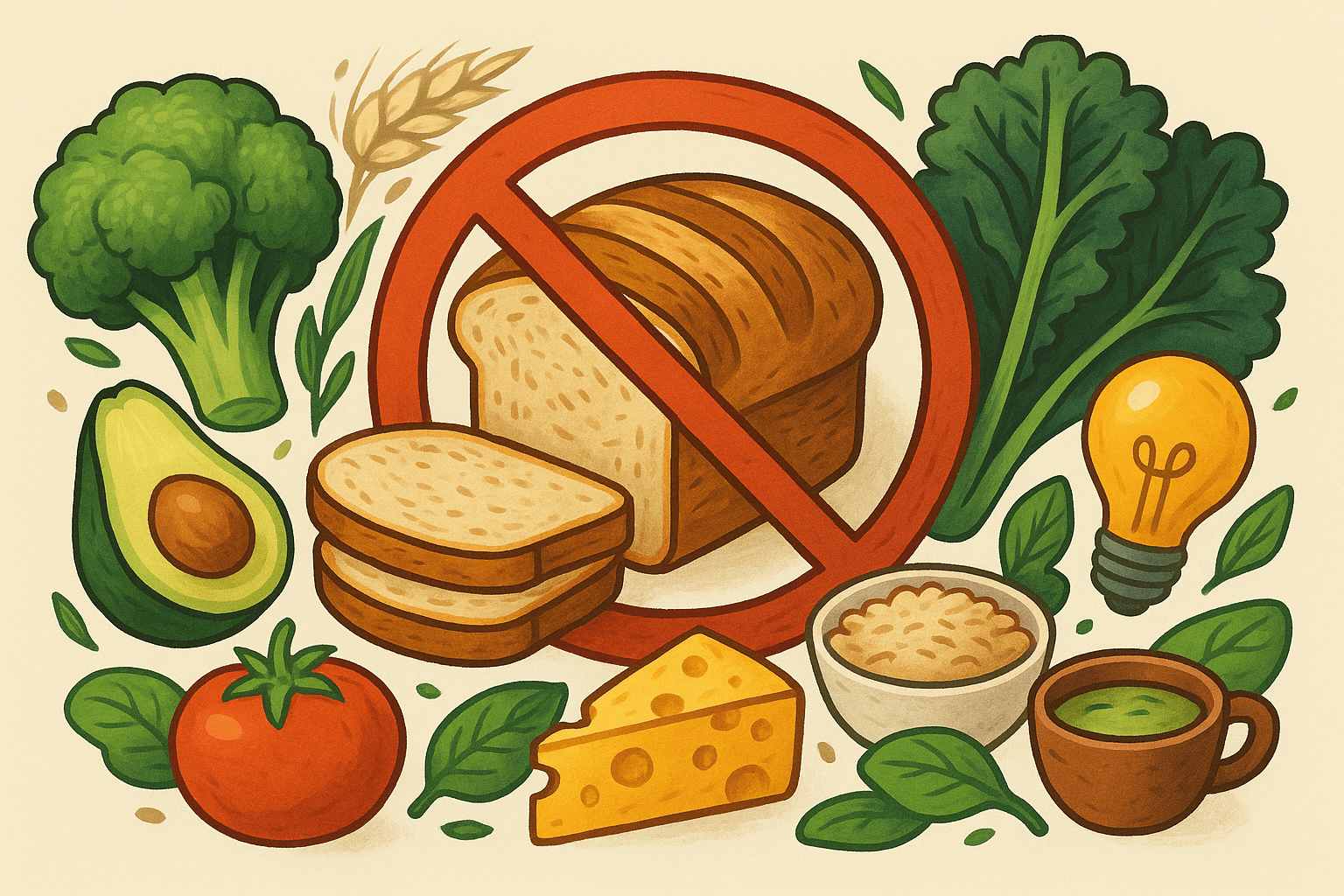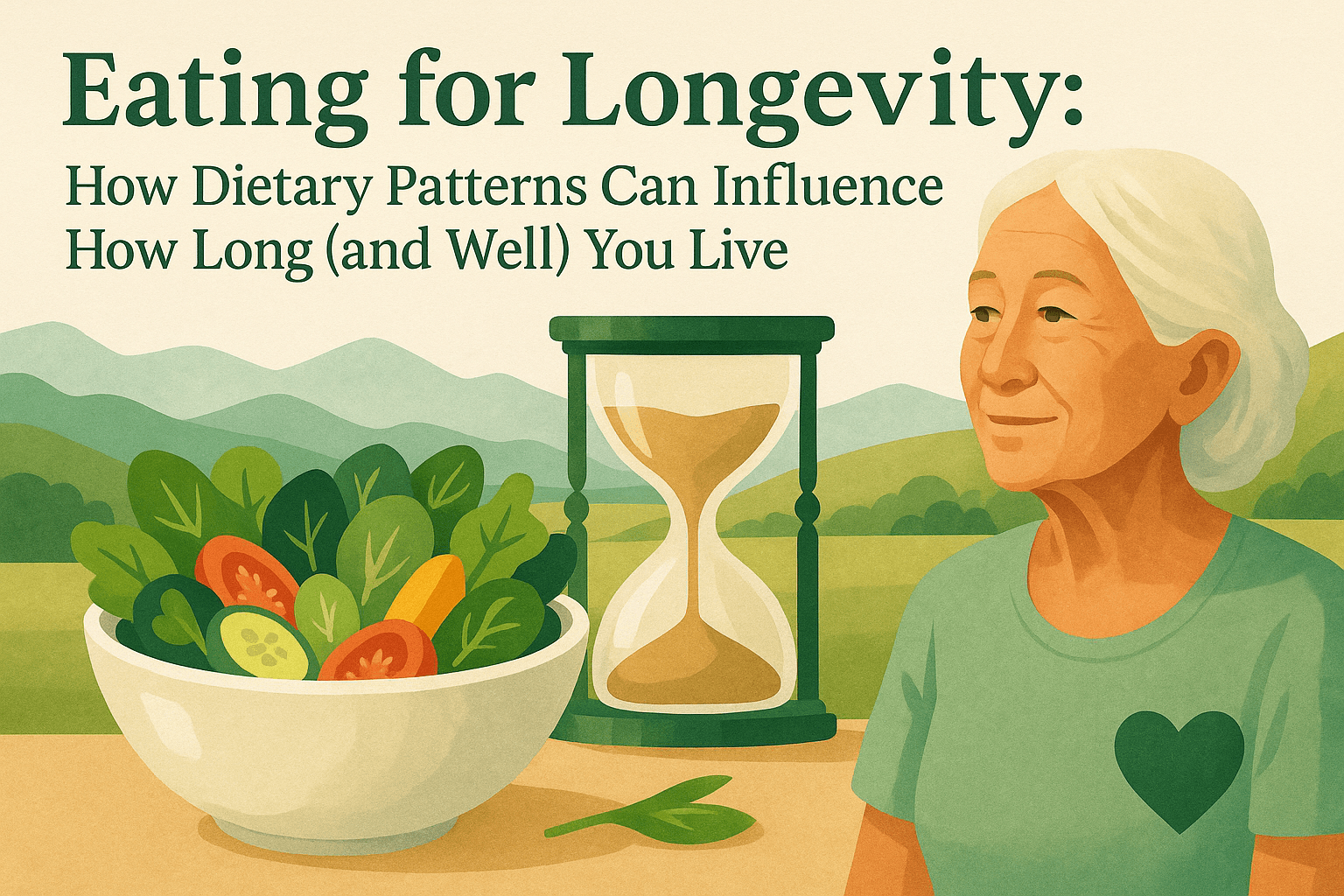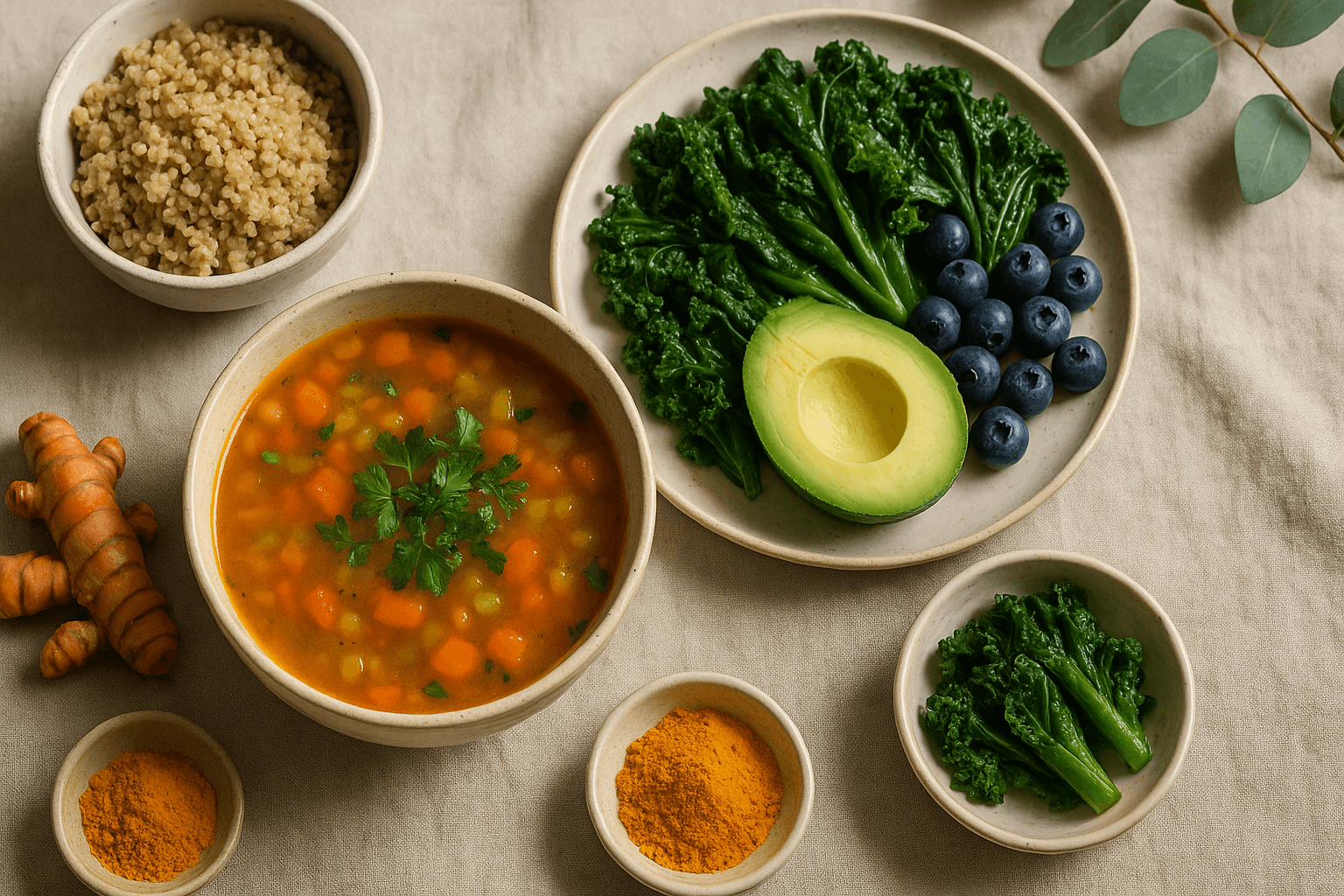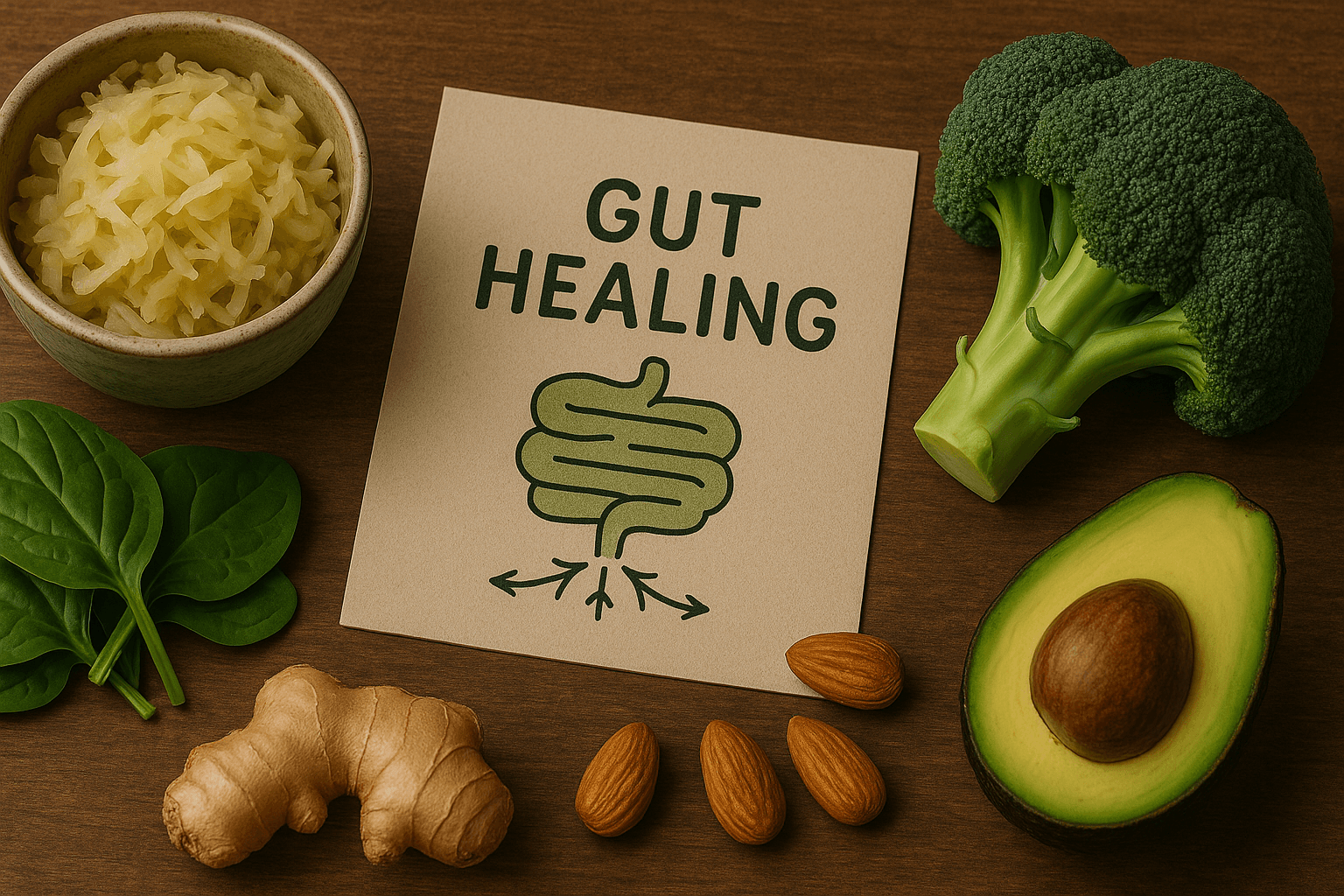The End of Food Combining: Nutrition Answers for a Calmer, Flatter, More Comfortable Belly
Published on May 22, 2025

If you feel bloated, gassy, or uncomfortable after meals — even healthy ones — you’re not alone. Bloating is one of the most common and misunderstood digestive complaints.
Often we blame it on beans, broccoli, or fiber. But the real culprit is usually compromised digestion, microbial imbalance, hormones, or even stress.
In this article you’ll explore:
The truth about bloating (and why fiber isn’t always to blame)
Foods, habits, and patterns that disrupt digestion
How gut microbes and meal timing influence bloat
The hormonal and inflammatory roots of water retention and gas
A simple, shame-free roadmap to beat the bloat and feel light again
What Exactly Is Bloating?
Bloating is a feeling of tightness, swelling, or fullness in the abdomen. It can be uncomfortable or even painful — and can show up minutes or hours after eating.
Types of bloating:
After-meal bloating: Linked to food intolerances or weak digestion
Hormonal puffiness: Related to estrogen, cortisol, and progesterone shifts
Gas bloat: Gut bacteria fermenting undigested carbs
Water retention: Sodium, inflammation, or hormone-related fluid balance
Common (and Overlooked) Reasons You Get Bloated
Fast or distracted eating:
Poor chewing leads to digestive overload
Eating in a rush activates fight-or-flight, suppressing digestion
Low stomach acid (hypochlorhydria):
Needed for protein breakdown and killing pathogens
Low acid = fermentation + gas
Enzyme deficiency:
Insufficient carb/fat/protein breakdown
Undigested food feeds gas-producing bacteria
Dysbiosis or SIBO:
Overgrowths in small intestine or colon
Fermentation = gas, bloating, inflammation
Food sensitivities:
Common triggers: gluten, dairy, soy, eggs
FODMAPs (fermentable carbs) also cause issues for some
Hormonal shifts:
Estrogen dominance, cortisol imbalance, low thyroid
Impact gut motility and fluid retention
Constipation:
Slows food transit, allowing gas to accumulate
Often tied to low fiber, dehydration, or stress
The Gut-Brain Connection
Your gut and brain are in constant conversation.
Stress reduces motility, stomach acid, and healthy microbial activity. Chronic stress blunts vagus nerve function — slowing digestion and leading to fermentation and bloat.
Mind-body habits that support digestion:
Diaphragmatic breathing
Mindful chewing
Vagal tone exercises
Eating without screens or multitasking
The Microbiome’s Role in Bloating
Your gut is home to trillions of microbes. Some help digestion. Others make gas.
When balanced:
Microbes create short-chain fatty acids (like butyrate) that reduce inflammation
When imbalanced:
Overgrowths = excessive fermentation and bloat
What feeds microbial imbalance:
Processed food
Low fiber diversity
Sugar alcohols like sorbitol or xylitol
Erratic eating and constant snacking
Hormones and Bloating
Estrogen: Promotes water retention and slows motility
Progesterone: Slows bowel movements
Cortisol: Increases gut permeability and inflammation
Insulin: Triggers sodium and water retention when chronically elevated
Thyroid hormones: Low levels impair motility and digestion
Menstrual-related bloating:
Peaks in luteal phase
Caused by hormone fluctuations and fluid shifts
Support hormones by managing stress, prioritizing sleep, and eating anti-inflammatory foods.
Foods and Nutrients That Can Help Calm Bloating
Top anti-bloat foods:
Cooked non-starchy vegetables
Ginger (anti-inflammatory, motility-promoting)
Peppermint (relaxes intestinal muscles)
Fennel (relieves gas and cramping)
Pineapple and papaya (natural enzymes)
Bone broth (amino acids for gut lining)
Oats and soaked chia (soluble fiber for motility)
Key nutrients:
Magnesium — relaxes muscles and improves motility
Zinc — supports gut lining
B vitamins — boost digestive energy
L-glutamine — repairs gut lining
Digestive enzymes — help break down meals
Foods and Habits to Reduce or Tweak
FODMAPs (for sensitive individuals):
Garlic, onions, legumes, wheat, apples, cruciferous veggies
Carbonated drinks:
Trap air and inflate the stomach
Artificial sweeteners:
Sorbitol, maltitol, mannitol ferment in the colon
Raw veggies in excess:
Can be harsh on sensitive guts — steam instead
Eating while multitasking:
Distracts brain from digestion and signals
Anti-Bloat Daily Ritual
Morning:
Water with lemon + pinch of sea salt
Protein + gentle carbs (eggs, oatmeal with chia)
Chew slowly, eat seated
Midday:
Cooked vegetables, lean protein, a little healthy fat
Herbal tea (ginger, peppermint, fennel)
Afternoon:
Light snack (banana + almond butter or zucchini + tahini)
Hydrate consistently
Evening:
Eat dinner at least 3 hours before sleep
Avoid heavy, spicy, or high-fat meals
Gentle walk or stretch
Calming tea or magnesium supplement
When to Seek Professional Help
If bloating is constant, painful, or worsening, consider testing for:
SIBO
H. pylori
Candida or parasites
Food intolerances (especially dairy, wheat, eggs)
Thyroid and cortisol imbalances
Bloating is a message, not a life sentence. The body wants to restore balance.
Final Thoughts: Trust Your Gut and Heal It Intentionally
You don’t have to live bloated.
With mindful eating, smart rhythms, gut-supportive foods, and stress reduction, you can calm inflammation, fire up digestion, and feel light again.
This isn’t about fearing fiber. It’s about understanding your unique gut blueprint — and honoring it daily.
So chew slowly.
Breathe deeply.
Eat with peace.
And let your belly be nourished, calm, and clear.








